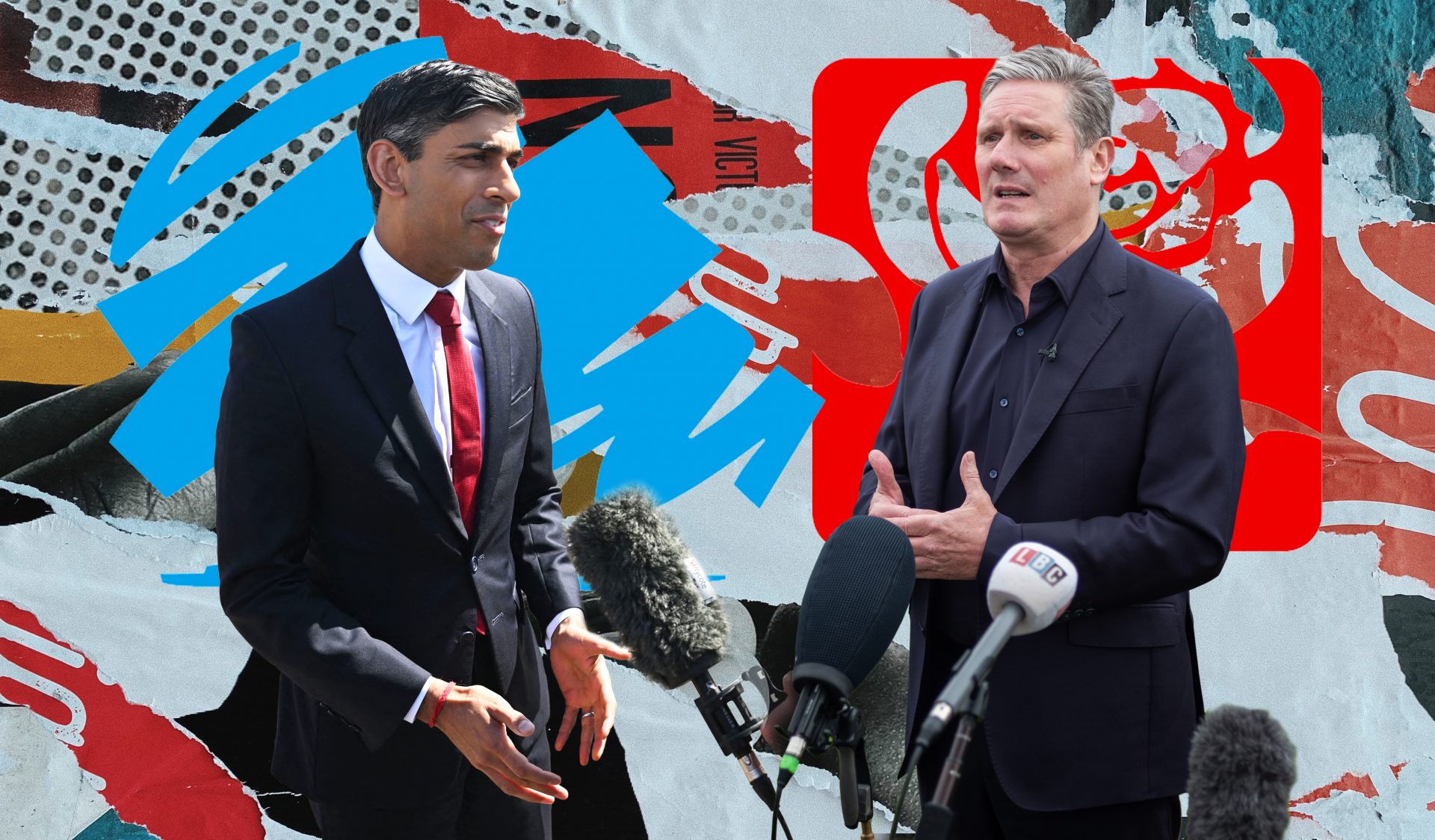In 1997 voters were promised that “things could only get better”. As it stands, it feels like in 2024 things will only get worse.
It becomes obvious just how miserable the state of the nation is now when we see what is supposed to qualify as “good news” – this week the IMF forecast that the UK economy might grow 0.4% this year. Usually that would qualify as dismal, barely keeping the country out of recession, but in the current climate it is the best we’ve got.
Inflation is still four times the official Bank of England target, despite the base rate of interest being 10 times what it was just 18 months ago. Funding-starved public services are on their knees, the NHS winter crisis has devolved into perma-crisis, infrastructure is crumbling and families can’t pay their bills.
All of this suggests a need for what during Barack Obama’s 2008 presidential run got dismissively described as “that hopey-changey stuff” – before Obama went on to win first the primaries and then the presidency, by a landslide.
The UK is in a much worse place in 2023 than the US was in 2008, and we need a dose of the same medicine, but no one seems prepared to offer it.
Instead, we have two rival packages of headline policies, one a set of “priorities” and the other a set of “missions”. Rishi Sunak has bet the farm on his “five priorities”, which are a mixture of nonsense, nothings, and just straight-out meanness.
Sunak pledged to halve inflation within a year, which was initially dismissed as something almost certain to happen, but a target that is now expected to be missed. The entire pledge was largely pointless, however, as it is the Bank of England – not No 10 – that has responsibility for tackling inflation. It is a testament to Sunak’s unique political skills that in trying to take credit for someone else’s work he landed himself with blame for its failure.
Sunak’s second pledge is for the economy to be growing, at least a bit, which is usually taken as a given from government. His third is to cut the national debt, which is widely regarded to be completely impossible without huge tax rises or spending cuts, neither of which has been offered nor would be politically feasible – at best we could reduce the deficit (the amount the government spends beyond what it takes in tax).
The fourth pledge is simply to reduce the NHS backlog, which is not falling nearly as fast as he needs it to, and the final is to stop small boat crossings – which is not only a doomed and cruel enterprise, but one that would deliver nothing for the British public.
The problem is not the failure or otherwise of these “priorities” – it’s how little they would offer even if they worked. We have reached a point where key Brexit-supporting newspapers and political figures admit it has not delivered what they hoped, that the UK is now a poorer country and getting poorer, and the government is failing to offer any remedy.
Despite its efforts to act as if it’s a new government that is barely a year old, a lack of ideas and an exhausted air is probably to be expected of a government that has been in office for 13 years and is now on its fifth prime minister – not so much the substitutes bench as the subs bench for the subs bench.
Margaret Thatcher and John Major might have managed 18 years in total, but with notably less internal chaos than we are enduring now, however tumultuous it all must have seemed at the time.
What is perhaps more alarming, though, is the paucity of ideas coming from the opposition – which feels as if it is looking at a government with almost historically terrible approval ratings and polling numbers, and is doing everything it can to emulate it.
Sir Keir Starmer has also settled on five goals for his party, but has settled for calling them “missions” instead of “priorities”. They do, at least on paper, set the bar a little higher than Sunak’s priorities, but they do somewhat lack specifics – Starmer’s promise is to “secure the highest sustained growth in the G7”, “make Britain a clean energy superpower”, “build an NHS fit for the future”, “make Britain’s streets safe” and “break down barriers to opportunity at every stage”.
These are all well and good, but the UK public has become somewhat inured to bluster after several years of a Boris Johnson government that constantly promised huge things and never delivered them. People reasonably want some kind of firm promises, with delivery dates – what can you do on childcare? Can you help me with my bills? Do I need to worry about getting social care for my dad?
When it comes to that kind of retail offer, Labour seems allergic to offering any form of hope. Starmer rightly understood that Labour needed to regain a reputation for responsibility after the public roundly rejected Corbynism in 2019. For all that supporters insist “the policies were popular”, while that was true individually, it was not in the round. People understand there are limits to how much a government can do all at once without tanking the economy.
But it’s arguable that Starmer is going too far, taking an axe to the core things Labour supporters and voters want from a new government. It is true taxes are already high, family budgets strained, and government borrowing is far more expensive than it was in 2019. But that doesn’t mean they can do nothing.
Imagine, for a moment, that you’re a Labour activist on the doorstep of a marginal Conservative/Labour street. Someone has answered their door to you, and agreed that the current government is awful. But, they ask, what will you lot do that’s different and helps me out?
If you can find a firm answer to that, explainable in a sentence or two and which will work for a regular voter, you have found a better retail offer than most people in Labour seem to have done.
Compounding that, the party seems determined to take the wrong lessons from recent by-elections. These were the worst-ever results in the modern political era on a by-election night for a sitting government, but somehow got spun as a disaster for Labour.
If your campaign can be derailed by a single issue (in this case the Ultra-Low Emission Zone), it tells you two things: you had a bad stance on that issue (in this instance sitting on the fence throughout the full campaign), but more importantly you had no issue of your own with which to rival it.
If you don’t have anything “retail” to offer voters, it is easy to have your campaign run into the ground. This is what happened to Theresa May in 2017 – she was so focused on getting things into her manifesto that would make it easier to govern, she forgot to put anything into it that would help her win.
As a result, her flagship policy for that election was the “granny tax”, leading to the bizarre situation that when Labour lost to perhaps the worst campaign ever in the modern political era, that was some kind of huge victory instead of just a universal embarrassment.
The fear is that all of this is terminal. Times of crisis need imagination, not managerialism. We can’t make a few small tweaks and suddenly be out of crisis. We need to boost productivity and invest in new sectors – as Ed Miliband is constantly pushing for, even as whispers stir in Westminster that the leader might want to move him.
We need genuine changes on planning, instead of just talking endlessly about them and delivering nothing.
But most importantly, we need an opposition willing to stand up for the issues it believes in – and this is a test Starmer consistently fails. Labour had rejected the bedroom tax at every election from 2015, and 2015’s manifesto was hardly a radically leftist one. Almost every relevant front-bencher is on the record denouncing the tax.
The case for cutting the tax could look roughly like this (these numbers are real): “Official figures show that scrapping the bedroom tax will lift one million children out of poverty, for less than half the tax we could take just by reforming the non-dom scheme. There is no cheaper way to take children out of poverty. Of course I would scrap it. My only confusion is why the government hasn’t done it already.”
The issue might not start in a place where it is popular for the government, but if you can get ministers defending keeping one million children in poverty when we can afford to lift them out, it will move. We deserve politicians with the courage to pick that fight.
The government is obviously running out of steam and has parts falling off every minute. Rather than measuring the curtains for No 10, or for ministerial offices, Conservatives are eyeing the exits – that’s to be expected.
What makes this forthcoming election feel so dismal is that the opposition feels exhausted, too. If 1997 was characterised by a sense of coming in with so much that needs doing and so much pent-up energy to make a change, Starmer’s Labour feels like an elderly royal offering to do a brief regency to calm things down.
People need concrete ideas, people want real change, but more than anything people need hope – and so far there’s none on offer.




